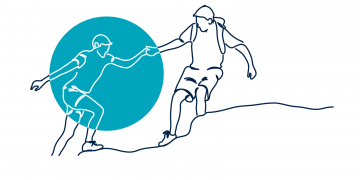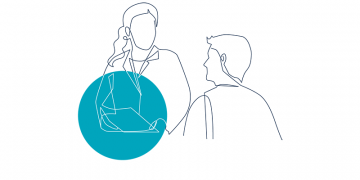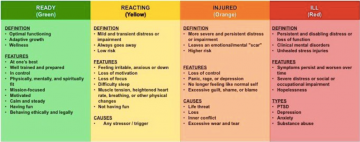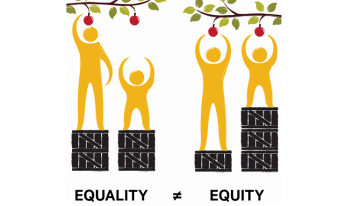By Beata Chami on November 8, 2023
Experience of imposter feelings is linked to poor mental health outcomes such as anxiety, depression, and burnout and results in lower professional fulfillment. There may not be a “cure” for imposter syndrome, but there are strategies available to minimize the onset of it. Addressing symptoms that can have a significant impact on your well-being and those that you care for.
By Dr. Katarina Wind on May 3, 2022
Medical school taught me that “obesity” is a cause of morbidity and mortality, and that weight loss is its cure. I recorded patients’ BMIs and counselled them on weight-loss strategies, believing that I was helping them.
By Drs. Tandi Wilkinson and Shireen Mansouri on December 7, 2021
We are hearing from many of our medical colleagues about their distress in this time of COVID-19. Many are troubled by the fact that most of the people admitted to hospitals and intensive care units are not vaccinated. Faced with yet another variant and uncertainty, we hear that our colleagues are exhausted, frustrated, and angry. Both authors, being interested in supporting physicians to thrive in their work, have been studying compassion and its role in practitioner well-being for the last few years. As looking at this issue (and other challenges of the pandemic) through the lens of compassion has been personally helpful to both of us, we wanted to share our learnings with you.
By Beata Chami on October 5, 2021
It has been eighteen months since COVID-19 emerged in Canada. The trajectory of the pandemic has placed a strain on our citizens’ mental health, particularly our frontline workers. While physician well-being has been a longstanding concern, the global pandemic has magnified the daily challenges that clinicians so bravely navigate to safeguard the health of their patients.
By Dr. Linda Uyeda and Dr. Ashley Miller on July 7, 2021
The ingredients needed to create a happy workplace also largely reflect the principles of secure attachment. Across all levels within organizations, if people do not feel “safe, seen, soothed, and secure” they are more likely to make errors, breach safety protocols, and struggle working together as a team.
By Sue Barlow and Carolyn Rondeau on June 3, 2021
Concussions or mild traumatic brain injury are the most common type of traumatic brain injury. It is estimated that every year in British Columbia (BC), there are approximately 14,500 visits to the emergency department and that this number is most likely an underestimate of the “true burden of concussion”.
By Dr. Ashley Miller and Dr. Linda Uyeda on May 12, 2021
As I started to understand that this pandemic would wear on, I had to figure out how to help my patients’ families and my own family navigate our way through this totally new reality. I drew on the science of attachment, resilience and healthy relationships to make a plan. (Please stay tuned for Article #3!)
By Dr. Jennifer Russel & Françoise Mathieu MEd RP on November 18, 2020
A few weeks into the COVID-19 crisis and as a psychiatrist working in a tertiary care hospital, while homeschooling my two boys, I had a strong awareness that I needed to really work to keep myself healthy in a way that I have never felt before to make sure I was able to survive this crisis. I needed to grab my psychological PPE.
By Dr. Joanna Cheek on August 5, 2020
It’s not easy to train in new skills to support our mental health when the race has already begun. We are all going to cycle out of the green zone many times, regardless of our practice of self-care. We need each other right now to provide peer support to help each of us notice when we’re moving to the right of the stress continuum and pause or pace ourselves so we can complete this marathon together.
By Dr. Shireen Mansouri on June 10, 2020
Compassion is the ability to notice that someone is suffering, feel connected to them, and want to act to alleviate the suffering. Self-compassion is the same as compassion but directed towards oneself. Be a good friend to yourself.
By Beata Chami on May 20, 2020
Healthcare professionals have been hit hard by the consequences of COVID-19. Some are putting in long hours, treating infected patients, and physically distancing themselves from their families. Others are losing work in their clinics and trying to figure out how to keep their practices afloat, all while worrying that they may be contracting the virus and putting their health at risk. This article will provide strategies and tools to support your well-being during the COVID-19 pandemic.
By Tandi Wilkinson MD CCFP-EM on April 1, 2020
I conducted a study examining effective peer support in rural Canadian physicians. (Spoiler alert: those who have had good peer support say it is essential to their career in medicine.) Here is what I am doing now to ensure I, and my team, can manage through this unprecedented time at work.
By Dr. Dan Bilsker on January 8, 2020
It is well-known that men die on average 3-4 years before women – but why? We identified three main factors contributing to Years of Life Lost by men compared to women: cardiovascular disease, suicide, and motor vehicle accidents. As a psychologist, I was intrigued by the substantial contribution of suicide.
By Dr. Tahmeena Ali on August 21, 2019
I now ask all patients, young and old, new to my practice and established for years, male and female, to complete an ACEs questionnaire in my clinic. I garner a new level of respect for my patients’ resilience and for the ongoing turmoil many of my young patients face. I make finding supports for these young vulnerable patients one of my top priorities—as important as a referral to a specialist or for diagnostic imaging.
By Beata Chami on July 10, 2019
Have you ever felt unable to make it to work, but disregarded the idea completely? These days, a common question either asked or assessed by healthcare organizations is to uncover the reason behind why doctors become unwell in their professional roles.
By Michelle C. Danda, RN, BN on October 10, 2018
I realized that engagement is paramount when working with an ambivalent patient, because the change that they want to make is often important in their life, even if the clinician views it as a problem behavior. Motivational interviewing education has been shown to improve patient alliance and treatment adherence.
By Dr. Colleen Varcoe and Dr. Heather Smith on August 15, 2018
Health equity-oriented care is now part of my daily practice; the tools created with, and provided by, the EQUIP study have helped to make health care inequity an issue that I can screen for and offer options for management.
By Dr. Maia Love on July 4, 2018
Defining yourself as a person first, and your role as a professional second, has benefits in preventing burnout and creating more personal energy. Put your own oxygen mask on first.
By Dr. Vincent Hanlon on March 14, 2018
Mindfulness is the awareness that emerges through paying attention to the unfolding of experience moment by moment. This paying attention is done on purpose, in the present moment, and it’s non-judgmental.
By Dr. Taryl Felhaber on September 20, 2017
Why should physicians encourage early and ultimate return to work whenever they can? In a nutshell, because it is usually in the patient’s best interest to remain in the workforce.
By Dr. Dan Bilsker on March 8, 2017
Treatment plan should specifically target psychological problems that are barriers to occupational, relationship or emotional function, rather than broadly defined issues. Being able to return to work is a substantial benefit for the individual: staying at home for an extended time is damaging to the individual’s self-esteem, coping ability and psychological health. Practice “positive psychology”, emphasizing the outcomes that determine the meaning and success of one’s life and focus on individual’s strengths to reach goals.
By Dr. Jan Hajek on August 3, 2016
For diabetes in particular, observational studies suggest that persons who follow a plant-based diet have a lower risk for diabetes, and an RCT demonstrated reductions in HbA1c in patients with diabetes randomized to a vegan diet compared to the standard American Diabetes Association diet.
By Dr. N. John Bosomworth on January 6, 2016
There is no evidence for benefit of weight loss in healthy people. The safest body size trajectory in healthy people is a stable weight. It takes a modest amount of exercise to attain good metabolic benefit. It takes substantial exercise commitment to produce weight loss or to prevent weight regain. Mediterranean diet reduces cardiac risk factors and mortality.
By Sue Barlow, OT and Jennifer Loffree, OT on December 2, 2015
The statistics regarding recovery from concussion indicate that the majority of individuals will be symptom-free at 3 months; within 6 months 70-75% will be symptom free; and within a year 10% will have 1 persisting symptom and 5% will have 4 or more persisting symptoms
By Andrea Warnick on April 29, 2015
Serious illness, dying, or death of a family member is one of the most significant life events a child will ever experience. I no longer wait for them to share their concerns and questions with me. I invite questions and address the grief.
By Francoise Mathieu on March 26, 2014
When you started your medical training, were you told that you could potentially be permanently psychologically damaged by your job? Did your medical school instructors provide you with a toolkit to prevent compassion fatigue and vicarious trauma?























Recent Comments